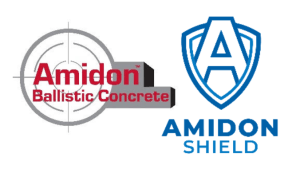
Concrete just got stronger.
No, really! Concrete can literally get stronger, according to concrete tech company 360° Ballistics. And it has the numbers to prove it.
This Cary-based startup is the producers of Amidon Ballistic Concrete (ABC), a patented technology of concrete that is able to absorb great impacts; and Amidon Shield, a high-performance, shock-absorbing concrete material. Amidon Shield was created based upon ABC’s successful performance to withstand high-impact activity.
 Concrete might seems like an almost indestructible substance—that’s why we construct buildings out of it—but in cases of targeted attacks or natural disasters, structures made of traditional concrete can crumble and fall apart. That’s because of a specific element in traditional concrete that prevents it from absorbing shock and dissipating energy well enough, causing it to crumble under intense pressure, according to 360°’s managing director Richard Kristof.
Concrete might seems like an almost indestructible substance—that’s why we construct buildings out of it—but in cases of targeted attacks or natural disasters, structures made of traditional concrete can crumble and fall apart. That’s because of a specific element in traditional concrete that prevents it from absorbing shock and dissipating energy well enough, causing it to crumble under intense pressure, according to 360°’s managing director Richard Kristof.
“None of [those structures] were really designed to deal with bullets, bombs or even hostile vehicles,” Kristof said. “There wasn’t a lot of attention being given on that … if you have hostile vehicles with explosives and run them through big areas with a lot of people, you’ve got a situation where traditional concrete is just no match for that.”
Others have tried to counteract this problem. The Army Corps of Engineers tried to implement a product called shock-absorbing concrete (SACON), in which they essentially injected foam into the concrete during the mixing process. But what happens is that since the foam is lighter than the other ingredients, it will rise to the surface and then all the heavy weight—the traditional concrete—falls to the bottom before the material sets. That results in a very uneven mix.
The way that 360° solved that problem is that they utilized a specialized, non-foam material to put into the concrete and a mixing process that allowed for a 100% uniform mixture, even when mixed in varied conditions. The mix creates a combination of air and structural fiber that allows concrete to absorb shock and come back together again.
The company’s technology essentially allows the concrete to flex and recover to 100%. They’ve proven this flexibility with their product mixture Amidon Shield, which has the strength to withstand 1270 flexural—a measure of the highest tension a material can survive before rupturing. Normal concrete would break under only half that much flex.

After four years and over 40 different tests, 360° has successfully created a scalable and repeatable process for manufacturing the concrete and have started to export materials to Europe and Australia.
ABC is currently primarily used for military and government facilities, mainly providing structures and building material for “shoot houses,” which are training facilities where active live-fire occurs. The company has deployed over 50,000 units in military bases across the country, including at Fayetteville’s Fort Liberty (formerly known as Fort Bragg). Over time, their deployed concrete structures have held up against more than 868 million rounds of ammunition—without crumbling.
Traditionally, military shoot houses are made of 1,400 pounds per square inch (psi) concrete, which is not suitable for the amount of ammunition exposure they receive. Concrete would have to be at least 3,000 psi for it to properly withstand that much impact. ABC and Amidon Shield material actually exceeded expectations and were able to build their concrete to 5,800 psi, but backed off to 4,500 psi to allow for more flex.
Since these structures are built to withstand devastating impacts like bullets or bombs, most traditional homes or offices are most likely not going to be built out of this material. However, Kristof said that this form of concrete can be beneficial for homes and buildings in areas where natural disasters are more likely to cause damage.
“You’ve got these multi-million dollar homes on the coast and they’re getting knocked down every seven to 10 years,” Kristof said. “It’s not so much the 150-mile-an-hour winds that are going to take the house down, it’s the fact that your neighbor’s house just got blown into yours.”
Lower carbon footprint
In general, concrete is an environmentally unfriendly material because of the amount of carbon that’s produced in its manufacturing. Though with the help of 360°, builders won’t need to populate as much material, as ABC will safely absorb any impact and can be easily repaired, reducing maintenance costs and downtime. In the future 360° also anticipates putting biomass and recycled material into the concrete, allowing it to be stronger and more malleable, while at the same time reducing its carbon footprint.
Kristof said it takes anywhere from five to seven years to introduce new building material to the market and 360° has only had its Amidon Shield product out for over a year. While they don’t plan to be involved in the construction of buildings themselves, they want to provide their products as a material for other construction companies to license and then build secure buildings out of this technology.
“We’ve really never had a failure in this field,” Kristof said. “And that’s exactly what the engineering community needs to see because most of those who build are not building buildings that have traditionally been secure structures. What we’re doing is we’re crossing over this engineering divide to a secure structure.”
Kristof said he sees 360° as a research and development company that produces products that can be licensed out to many companies, and then those companies would take that product to the market. On their end, they can identify licensees, train them and support them and continue while they’re developing new products along the way.
You can view a demonstration of ABC and Amidon Shield in action here.
